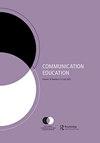“It takes a village”: proposing critically reflexive (co-)mentoring with underrepresented students as racialized, gendered, and othered
IF 0.8
Q3 COMMUNICATION
引用次数: 1
Abstract
Despite good intentions, the U.S.-based communication discipline has “hardly addressed these [raceless/genderless/cultureless] underrepresentation issues” (Waymer, 2021, p. 114). One considerable gap remains in mentoring underrepresented students, as evidenced in Calafell’s (2007) letter calling for mentorship as “a site of embodied resistance” (p. 425). As a Black male doctoral student and an Asian/immigrant female associate professor, we reflect on critical moments as a mentee–mentor dyad and advocate (co-)mentoring approaches to diversify the communication (education) professions that reflect the diverse U.S. populations. Responding to Waymer’s (2021) stimulus essay, we believe that communication education scholarship, as aligned with critical communication pedagogy, plays a critical role in (co-)mentoring underrepresented students as future educators for racial and intersectional justice advocacy.“这需要一个村庄”:建议对种族化、性别化和其他化的代表性不足的学生进行批判性反思性(共同)辅导
尽管初衷良好,但美国的传播学科“几乎没有解决这些[无种族/无性别/无文化]代表性不足的问题”(Waymer,2021,第114页)。在指导代表性不足的学生方面仍然存在一个相当大的差距,Calafell(2007)的信中就证明了这一点,该信呼吁将指导作为“一个具体抵抗的场所”(第425页)。作为一名黑人男博士生和一名亚裔/移民女性副教授,我们反思了作为受试者-导师二人组的关键时刻,并倡导(共同)指导方法,以使反映不同美国人口的沟通(教育)职业多样化。针对Waymer(2021)的刺激文章,我们认为,沟通教育奖学金与批判性沟通教育学相一致,在指导代表性不足的学生成为种族和跨部门正义倡导的未来教育者方面发挥着关键作用。
本文章由计算机程序翻译,如有差异,请以英文原文为准。
求助全文
约1分钟内获得全文
求助全文
来源期刊

COMMUNICATION EDUCATION
EDUCATION & EDUCATIONAL RESEARCH-
CiteScore
3.10
自引率
34.80%
发文量
47
期刊介绍:
Communication Education is a peer-reviewed publication of the National Communication Association. Communication Education publishes original scholarship that advances understanding of the role of communication in the teaching and learning process in diverse spaces, structures, and interactions, within and outside of academia. Communication Education welcomes scholarship from diverse perspectives and methodologies, including quantitative, qualitative, and critical/textual approaches. All submissions must be methodologically rigorous and theoretically grounded and geared toward advancing knowledge production in communication, teaching, and learning. Scholarship in Communication Education addresses the intersections of communication, teaching, and learning related to topics and contexts that include but are not limited to: • student/teacher relationships • student/teacher characteristics • student/teacher identity construction • student learning outcomes • student engagement • diversity, inclusion, and difference • social justice • instructional technology/social media • the basic communication course • service learning • communication across the curriculum • communication instruction in business and the professions • communication instruction in civic arenas In addition to articles, the journal will publish occasional scholarly exchanges on topics related to communication, teaching, and learning, such as: • Analytic review articles: agenda-setting pieces including examinations of key questions about the field • Forum essays: themed pieces for dialogue or debate on current communication, teaching, and learning issues
 求助内容:
求助内容: 应助结果提醒方式:
应助结果提醒方式:


